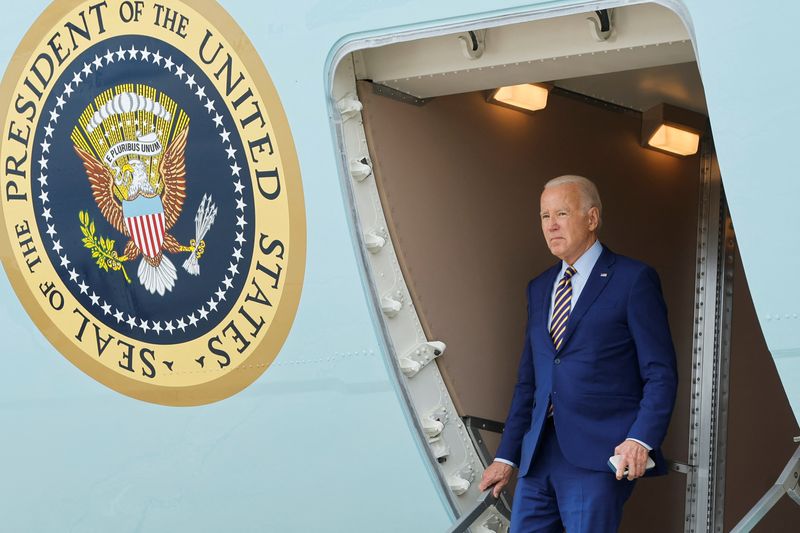Biden’s junk fee crusade turns to short-term health insurance plans
2023.07.07 12:15

© Reuters. FILE PHOTO: U.S. President Joe Biden arrives aboard Air Force One at Joint Base Andrews, Maryland, U.S. July 6, 2023. REUTERS/Jonathan Ernst
WASHINGTON (Reuters) – President Joe Biden on Friday announced new steps to crack down on short-term health insurance plans and surprise medical bills, stepping up his war against so-called junk fees to lower healthcare costs.
This will include a proposed rule that closes loopholes companies use to offer misleading short-term insurance products, discriminate based on pre-existing conditions, offer little to no coverage and saddle consumers with thousands of dollars worth of medical expenses, White House Domestic Policy Adviser Neera Tanden told reporters.
The Obama administration in 2016 limited short-term insurance plans to three months to try to get more people on year-round plans, but regulations adopted by the Trump administration in 2018 allowed people to stay on such plans for 12 months and renew them for three years.
“These plans leave families surprised by thousands of dollars in medical expenses when they actually use health care services like a surgery,” the White House said on Friday.
With inflation still a potent political issue, the Biden administration has made it a priority to fight hidden fees by asking federal regulators to increase their oversight of companies across a range of industries including hotels, banks and airlines.
Biden, who in over two years as president has witnessed a sharp rebound from the COVID-19-induced recession, has nonetheless watched his public approval ratings sag under the weight of voters’ anxiety about inflation and the economy’s direction.
Job creation and low unemployment are the positives while elevated inflation and the knock-on effects of spiking interest rates over the past year in areas such as the housing market have stoked fears of recession.
Biden will also announce new rules to cut down on surprise medical billing, limit the use of third-party medical credit cards that include “teaser rates” and do not fully disclose the risks, Tanden said.
Surprise bills can occur when people are taken to the nearest hospital for emergency care or when someone goes to an in-network hospital but one of the doctors who treat them there is out-of-network, leading to surprise bills, the White House said.
More than half of Americans disapprove of how Biden is handling his job, while just 35% of respondents approve of his stewardship of the economy, according to a Reuters/Ipsos poll conducted in June. Voters rate the economy as their top issue.








